Driving in Great Britain
The total length of roadways of Great Britain is 398,350 km. Length of motorways - 3,557 km. Length of paved roads - 344,000 km and unpaved roads - 54,350 km.
You drive in Great Britain on the Left side.
ContentsToll roads
In Great Britain, there is a charge for using some roads depending on the category of vehicle and the distance traveled. Some bridges and tunnels are also subject to payment.
Currently, the only UK motorway to be paid is the M6. It is located north of Birmingham.
Map of the M6 motorway in the UK
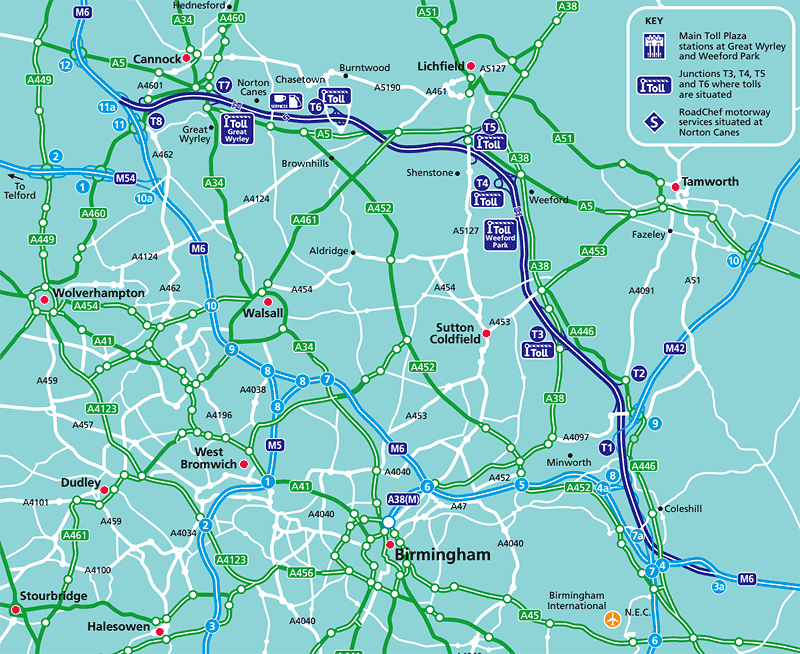
Toll rates on motorway M6 in UK
The price you pay depends on the classification of vehicle you are driving. Rates alter according to the time of day.
Toll rates at 2023:| CLASS | VEHICLE | Mon - Fri (07:00-19:00) |
Mon - Fri (05:00-07:00) (19:00-23:00) |
Sat - Sun (05:00-23:00) |
NIGHT (23:00-05:00) |
|---|---|---|---|---|---|
| 1 | £ 4.00 (€ 4.80) | £ 3.90 (€ 4.60) | £ 4.00 (€ 4.80) | £ 3.60 (€ 4.30) | |
| 2 | £ 8.20 (€ 9.80) | £ 8.20 (€ 9.80) | £ 8.20 (€ 9.80) | £ 7.00 (€ 8.30) | |
| 3 | £ 12.10 (€ 14) | £ 12.10 (€ 14) | £ 11.90 (€ 14) | £ 11.10 (€ 13) | |
| 4 | £ 14.30 (€ 17) | £ 14.30 (€ 17) | £ 13.60 (€ 16) | £ 13.00 (€ 15) |
Vehicle classification in UK
The toll system automatically classifies vehicles and charges separate rates for each category, depending on the size of the vehicle. Each time you pass through a Toll Lane our sensors tell us how many axles your vehicle has and how high it is from the point of the first axle. This tells us which class your vehicle falls into.
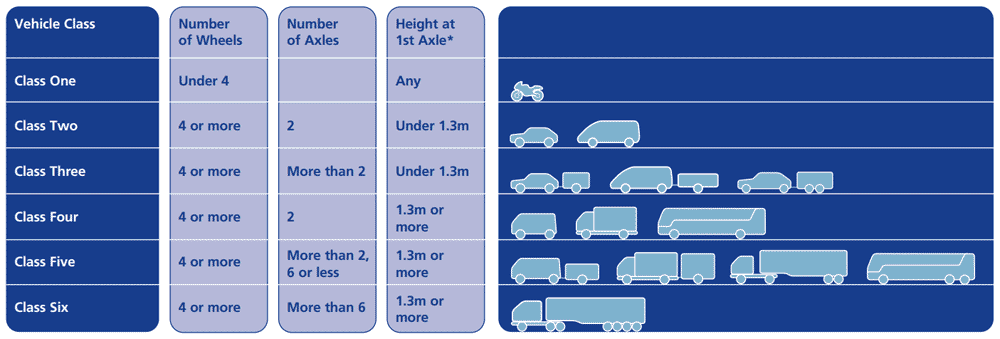
* The measurement is taken from the ground to the top of the vehicle at the point of the first axle:
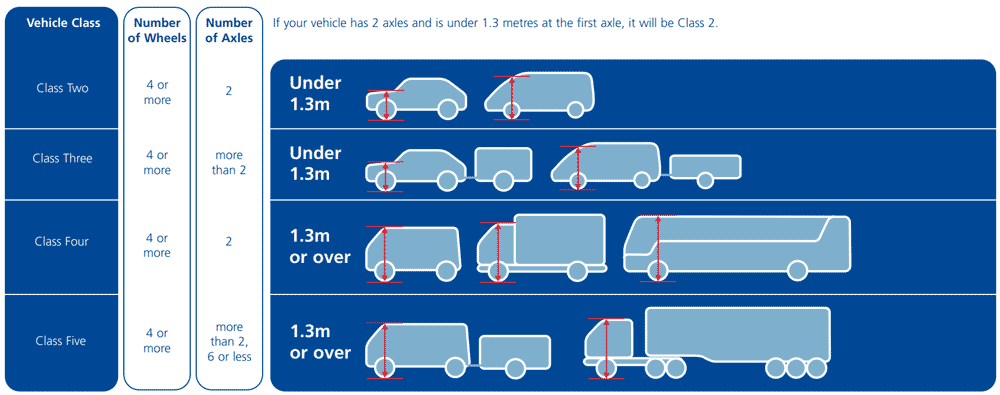
Map of the M6 motorway showing all entries and exits (283 Кб).
Ways of payment
Credit cards
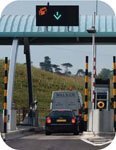
The credit card symbol is located in the upper left corner. The following credit cards are accepted:
- Visa
- Eurocard - Mastercard
- American Express
Electronic system
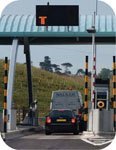
The symbol for automatic payment (letter T) is located in the lower left corner.
Benefits of Electronic Payment:
- Discount on every trip
- Leased lanes
- Driving without delay
Attended lanes
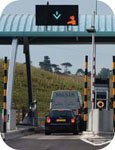
The symbol for manual payment is located in the lower right corner.
Coins and banknotes are accepted. Exchange possible. A check is issued.
Special toll
In the UK, in addition to the M6 motorway, some bridges and tunnels are subject to payment.
Toll rates on tunnels in the UK
Toll rates at 2023:| Tunnel | Car | Car with trailer | Additional Information |
|---|---|---|---|
| Dartfor | £ 2.50 (€ 3.00) | £ 2.50 (€ 3.00) | A282/M25 (free from 22:00 to 06:00) |
| Mersey (Kingsway) | £ 2.00 (€ 2.40) | £ 4.00 (€ 4.80) | between Wallasey and Liverpool |
| Mersey (Queensway) | £ 2.00 (€ 2.40) | £ 4.00 (€ 4.80) | between Birkenhead and Liverpool |
| Tyne | £ 1.90 (€ 2.30) | £ 3.90 (€ 4.60) | at A19 between Jarrow and Howdon |
Tunnel access for motorcycles is free.
Toll rates on bridges in the UK
Toll rates at 2023:| Bridge | Car | Car with trailer | Additional Information |
|---|---|---|---|
| Humber | £ 1.50 (€ 1.80) | £ 4.00 (€ 4.80) | at A15 |
| Itchen | £ 0.80 (€ 1.00) | £ 0.80 (€ 1.00) | at A3025 |
| Queen Elizabeth II | £ 2.50 (€ 3.00) | £ 2.50 (€ 3.00) | at A282/M25 (free from 22:00 to 06:00) |
| Dunham | £ 0.40 (€ 0.50) | £ 0.40 (€ 0.50) | at A57 |
| Mersey Gateway | £ 2.00 (€ 2.40) | £ 2.00 (€ 2.40) | at A533 |
| Tamar | £ 2.60 (€ 3.10) | £ 5.20 (€ 6.20) | at A38 (fee is charged only when moving east) |
For motocycles bridges are free.
Since March 1, 2013, the Itchen bridge toll collection system has become fully automatic. Now the fare can only be paid with coins (accepted coins in denominations of £ 2, £ 1, 50p, 20p, 10p) or with a SmartCities card.
Starting December 17, 2018, travel across both Severn bridges connecting England to Wales became free.
Travel over Tamar Bridge is only paid when driving in the direction from Saltash (Cornwall) to Plymouth (Devon).
In the UK, there are several bridges on minor roads, which also incur fare.
Eurotunnel
The Eurotunnel passes under the English Channel. Its length is about 51 km, of which 39 km is under the bottom of the strait. The tunnel connects continental Europe with the UK.
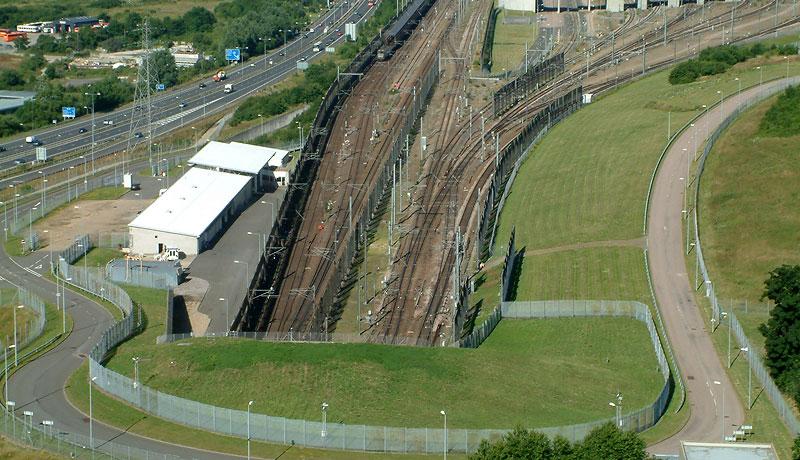
Tunnel location in UK: Google Maps, Google Earth.
The toll includes car transportation, up to 9 passengers and luggage. There are several types of tickets:
- Day Trip & Overnight — ticket must be purchased as part of a 2 day return. Return must be completed by midnight (local time) on the second calendar day. Price from £ 31 (€ 37) per car, each way.
- Short Stay — ticket must be purchased as part of a 5 day return. Return must be completed by midnight (local time) on the fifth calendar day. Price from £ 73 (€ 87) per car, each way.
- Single or Long Stay — standard tickets. Price from £ 91 (€ 108) per car, each way.
On the video you can see travel through the Eurotunnel from England to France (more video at our YouTube channel).
Detailed information on all tariffs can be found on the official website of the Eurotunnel
Congestion Charge in London
The Congestion Charge is an £ 15.00 (€ 18) daily charge for driving a vehicle within the charging zone between 07:00 and 18:00, every day, except Christmas Day (25 December).
You only need to pay once, no matter how many times you drive in and out of the Congestion Charge zone on the same day.
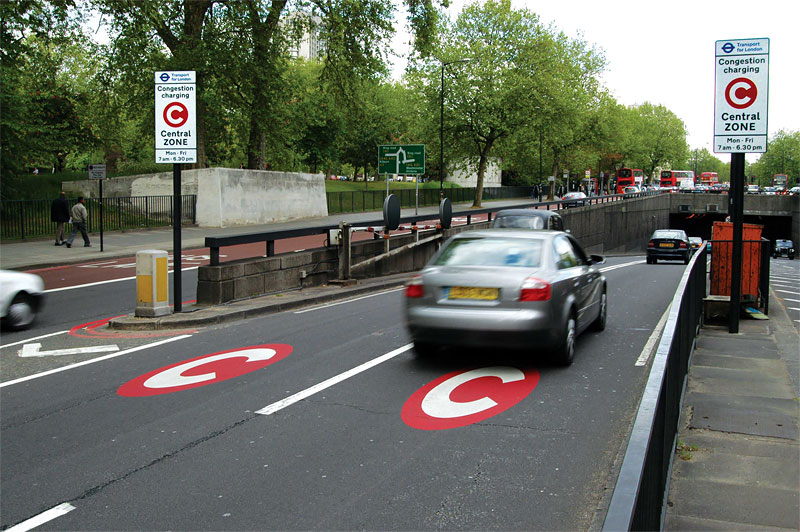
You can pay in advance, on the day of travel or by midnight of the third charging day after travel. The daily charge is £ 15.00 (€ 18) if you pay in advance or on the same day, or £ 17.50 (€ 21) by midnight of the third charging day after travel.
If you don't pay by midnight on the charging day after you drove in the zone, you'll get a Penalty Charge Notice (PCN). The amount of the fine is £ 160 (€ 190). It must be paid for 28 days. If you pay within 14 days of the date of service you will receive a 50% discount, the amount that must be paid being the discounted amount for the contravention date.
If the penalty charge is not fully paid within 28 days of the date of service, then the penalty charge you have to pay increases by 50% of the full penalty charge - £ 240 (€ 286). A Charge Certificate is then sent to the registered keeper of the vehicle.
You don't have to pay the Congestion Charge or register with us if the vehicle is recorded at the DVLA in one of these categories:
- Two-wheeled motorbikes (and sidecars) and mopeds
- Emergency service vehicles, such as ambulances and fire engines, which have a taxation class of 'ambulance' or 'fire engine' on the date of travel
- NHS vehicles that are exempt from vehicle tax
- Vehicles used by disabled people that are exempt from vehicle tax and have a 'disabled' taxation class
- Vehicles for more than one disabled person (for example Dial-a-Ride) that are exempt from vehicle tax and have a 'disabled' taxation class
The boundaries of the zone are clearly marked with special signs. There are no barriers or special cabs to levy at the borders of the London toll area. Borders are controlled by cameras that record all the numbers of passing cars, on the basis of which the necessary fee is then paid. The cameras recognize both British and other European numbers.
You can pay the fee online here
Congestion Charge Zone map in London (613 Кб).
Ultra Low Emission Zone (ULEZ) in London
The Ultra Low Emission Zone (ULEZ) replaced the T-Charge on 8 April 2019. It operates 24 hours a day, 7 days a week, every day of the year (except Christmas Day), within the same area as the Congestion Charge zone.
Most vehicles, including cars and vans, must comply with ULEZ emission standards. Otherwise, drivers must pay a daily fare within the zone.
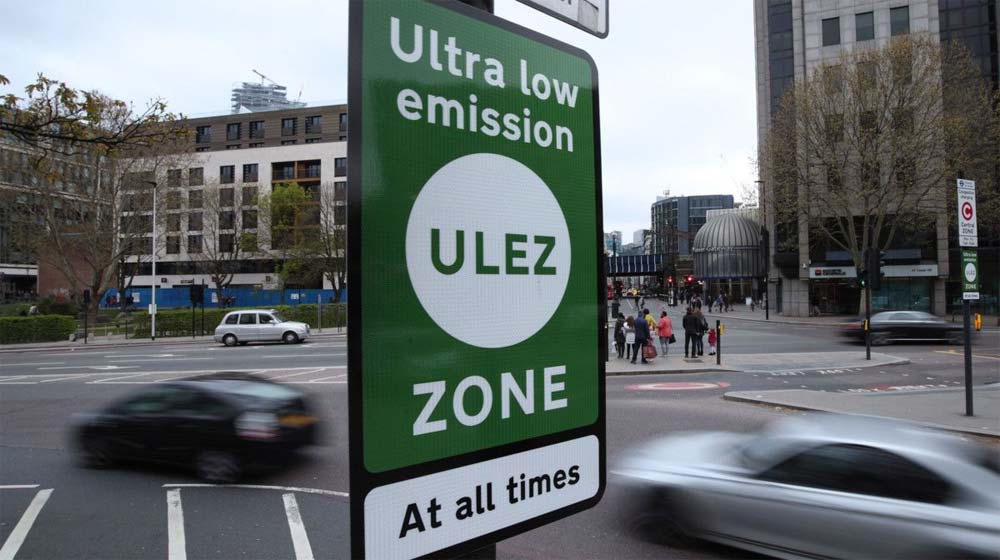
Minimum emission standards:
- Motocycles - EURO 3;
- Petrol - EURO 4;
- Diesel - EURO 6.
Petrol cars that meet the ULEZ standards are generally those first registered with the DVLA after 2005, although cars that meet the standards have been available since 2001. Diesel cars that meet the standards are generally those first registered with the DVLA after September 2015.
If your car does not meet the ULEZ requirements, then for each entry you need to pay £ 12.50 (€ 15). The fines are the same as for entering the Congestion zone.
A daily charge runs from midnight to midnight. If you drive within the ULEZ area across two days, for example before midnight and after midnight, you will have to pay two daily charges. These are in addition to any Congestion Charge that applies.
Owners of non-UK registered vehicles must also pay the ULEZ charge to drive within the zone if they do not meet the emissions standards. Register your vehicle before you start and you will know about pay ULEZ or LEZ charges for your vehicle, and you believe that's not the case.
Low Emission Zone in London
The Low Emission Zone (LEZ) operates to encourage the most polluting heavy diesel vehicles driving in London to become cleaner. The LEZ covers most of Greater London and is in operation 24 hours a day, every day of the year.
LEZ requirements apply only to vans, minivans, motorhomes, pickups with a total weight of over 1,205 kg and less than 3,500 kg and minibuses with a total weight of less than 5,000 kg. If the car is registered after January 1, 2002, then it meets the requirements of LEZ.
If your vehicle does not meet emission standards, the daily entry fee for the Low Emission Area (LEZ) is £ 100 (€ 119).
If you do not pay the fare before midnight the next day after entering the zone, the fine will be £ 500 (€ 595). If paid less than 14 days in advance, the penalty will be reduced to £ 250 (€ 298).
Low Emission Zone map in London (1.6 Mб).
Parking in Great Britain
Before parking, make sure that you do this in an authorized place. There are many traffic policemen and fines are very high.
In most parking lots at the entrance, a ticket is taken and payment is made upon departure. Also in the UK there are "pay and display" parking lots. You need to buy a ticket for a certain period of time and placed under the windshield.
The double and single yellow and red lines along the edge of the road are used to show where motorists can and cannot park:
- Single yellow line - there are restrictions on parking at certain times. A stop is allowed for disembarking passengers, but the driver must remain in the car.
- Double yellow lines - no parking at any time
- Single red line - there are restrictions on parking at certain times
- Double red lines - no parking at any time
Detailed information on parking you can be found on the website Directgov
Road map in Great Britain
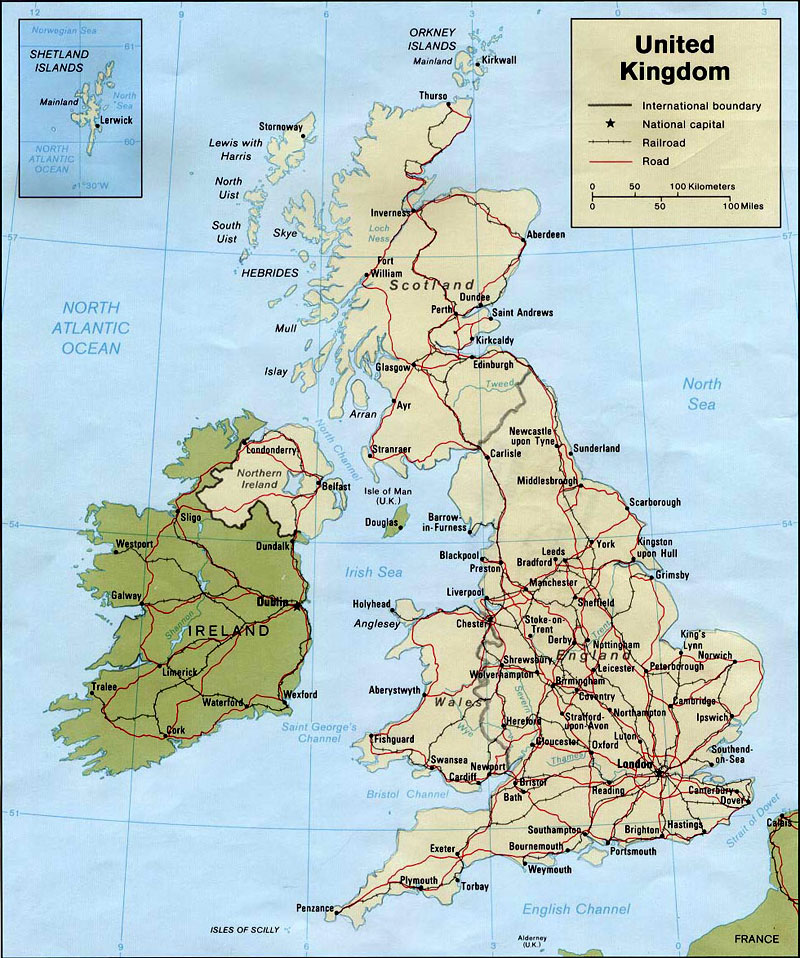
Road map in England (764 Кб).
Road map in Scotland (246 Кб).
Road map in Wales (134 Кб).
Road map in North Ireland (269 Кб).
Buy a Great Britain Road Map on Amazon
Road rules in Great Britain
Speed limits
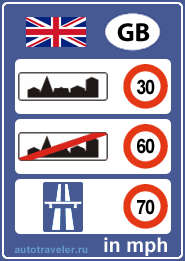
Standard speed limits in Great Britain (unless otherwise indicated on the signs).
Cars (to 3.5 tons) and motorcycles:- built-up areas - 48 км/ч
- outside built-up areas - 96 км/ч
- expressway - 112 км/ч
- motorway - 112 км/ч
- built-up areas - 48 км/ч
- outside built-up areas - 80 км/ч
- expressway - 96 км/ч
- motorway - 96 км/ч
- built-up areas - 48 км/ч
- outside built-up areas - 96 км/ч
- expressway - 112 км/ч
- motorway - 112 км/ч
- built-up areas - 48 км/ч
- outside built-up areas - 80 км/ч
- expressway - 96 км/ч
- motorway - 112 км/ч
If you don’t see any speed limit signs, a 30 mph (48 km/h) limit applies.
On vehicles with more than 8 seats, a speed limiter must be installed to limit the fuel supply to the engine in order to prevent exceeding the maximum allowed speed.
The current maximum speed limits on the roads of European countries for cars.
Alcohol
The maximum permitted level of alcohol in the bloodstream is 0.8 ‰.
The maximum permitted level of alcohol in the bloodstream in Scotland since December 5, 2014 – 0.5 ‰.
Police may ask a driver suspected of having committed a violation to take a breath test.
If the violation is committed for the first time, then a fine of up to £ 5,000 (€ 5,952) and / or imprisonment for 6 months and withdrawal of a driver's license for 1 year.
The same punishment threatens in case of refusal to pass the test for the presence of alcohol.
In the event of death by negligence while exceeding the maximum permissible level of alcohol, you may face imprisonment of 14 years, an unlimited fine and the withdrawal of a driver’s license for 2 years.
The police have the right to conduct tests to identify a driver who may be under the influence of drugs.
Foreign drivers will be required to pay a fine of a fixed fine or £ 300 (€ 357) as a deposit for a possible legal fine. Deposit must be paid on the spot.
The maximum permitted alcohol limit for drivers in European countries.
Dipped headlights
Motorists must use dipped headlights between sunset and sunrise at night (half an hour after sunset and half an hour before sunrise) on all roads without street or road lighting.
Motorists must use the dipped headlights at night, even on lighted highways and on roads with a speed limit of more than 30 mph/h.
The headlights of cars with a left-hand drive must be sealed with adhesive tape so as not to blind the oncoming drivers. Otherwise, you run the risk of being stopped by the police and subsequently fined up to £ 1,000 (€ 1,190).
In which European countries is the use dipped headlights in daytime mandatory?
Children in cars
Children between the ages of 3 to 11 years old and height up to 135 cm must use a child car seat.
Children under the age of 3 years must be transported in a child restraint device appropriate for their weight in any vehicle (including a minibus).
Before installing a child seat in the front seat, the front airbags must be deactivated. In the United Kingdom, it is only permitted to use child seats in accordance with EU standards (marked with a capital letter ‘E’ in a circle).
The driver is responsible for complying with this law for children under the age of 14 with a fine of between £ 30 and 500 (€ 36-595).
Seat belts
The use of seat belts is mandatory for front and rear passengers.
If the car does not have seat belts (for example, this is a classic car), then it is not allowed to transport children under the age of 3 years. Children over 3 years old are only allowed in the rear seats. These rules apply only if the car was originally released without seat belts.
Fine — from £ 30 to 500 (€ 36-595).
Mobile phone
It is forbidden to use a telephone communication device while the vehicle is in motion, not equipped with a technical device that allows negotiating without using hands.
As an exception, you can use the phone while driving in the following cases:
- you need to call 999 or 112 in case of emergency, and stopping the vehicle is unsafe or inappropriate;
- the car is safely parked.
It is forbidden to use the phone even if you stop at a traffic light or in traffic.
Fixed fine — £ 200 (€ 238).
When considering a case in court, a maximum fine of up to £ 1,000 (€ 1,190).
Mobile phone while drivig in Europe
Penalties for using mobile phone while driving in Europian countries.
Window Tinting
The degree of tinting the windshield and front door glass depends on the time of the first registration of the vehicle.
- If the vehicle was registered after April 1, 1985, then the light transmission of the windshield should be at least 75%, and the glass of the front doors should be at least 70%;
- If the vehicle was registered before April 1, 1985, then the light transmission of the windshield and glass of the front doors is the same and should be at least 70%.
On the windshield, it is allowed to apply a light-protective film with a width of not more than 6 inches (15 cm) from the upper edge outside the coverage area of the wipers.
There are no restrictions for tinting the rear windshield and rear door windows.
If the degree of light transmission of the windshield and glass of the front doors is less than permissible, then in the event of a stop, further movement will be allowed only after removing the tint film.
Fines
Foreign drivers who commit traffic violations will have to pay a deposit of a fine of £ 300 (€ 357) as a guarantee of a potential fine in court. Deposit must be paid on the spot.
Traffic fines in Great Britain:| Violation | Fine |
|---|---|
| Careless or Inattentive Driving | to £ 5,000 (€ 5,952) |
| Leaving the scene of an accident | to £ 5,000 (€ 5,952) |
| Lack of insurance | to £ 2,500 (€ 2,976) |
| Speeding | from £ 100 to 1,000 (€ 119-1,190) |
| Speeding on motorway | to £ 2,500 (€ 2,976) |
When determining speeding in the UK, the following error applies - 10% of the speed limit plus 2 mph/h.
at a permitted speed of 30 mph, the error will be 3 mph (10% of 30 mph) + 2 mph/h.
Total - 5 mph. That is, speeding over 35 mph will be considered an excess.
Useful information
Fuel prices
Unleaded gasoline (95 and 97) and diesel are available in the UK. Leaded gasoline is no longer available.
Gasoline with an octane number of 97 is poorly distributed in the UK, so its average prices can fluctuate greatly.
Average prices for all types of fuel at 2024-07-23:
- Premium unleaded — £ 1.469 (€ 1.745)
- Super unleaded — £ 2.004 (€ 2.381)
- Diesel — £ 1.509 (€ 1.793)
- LPG — £ 0.889 (€ 1.056)
Trends gasoline prices in Great Britain for last years.
It is forbidden to transport gasoline in cans on ferries.
Changes from the previous period are shown. Update every two weeks.
Emergency phone numbers
- Emergency care (police, fire service, ambulance) - 999
- Operator (free information on consumer services) - 100
Winter equipment
Winter tires
The use of winter tires in Great Britain is optional.
Winter tires make sense if you are heading to the northern areas of Scotland, where winter conditions will last longer.
Spiked tires
The use of studded tires is permitted, but due to mild weather conditions is hardly necessary. Spike tires should not damage the road surface. From the point of view of the law, there are no speed limits for cars with studded tires.
Snow chains
Snow chains may only be used with summer tires if the road is completely covered with snow or ice.
Winter equipment for car in Europe
Requirements for using of winter and studded tires in different countries of Europe.
Optional equipment and other rules
Although not required, it is recommended that you have a warning triangle, a first aid kit, a fire extinguisher and a reflective vest in case of breakage. Motorists should not use the warning triangle on the motorway.
The use of radar detectors is permitted.